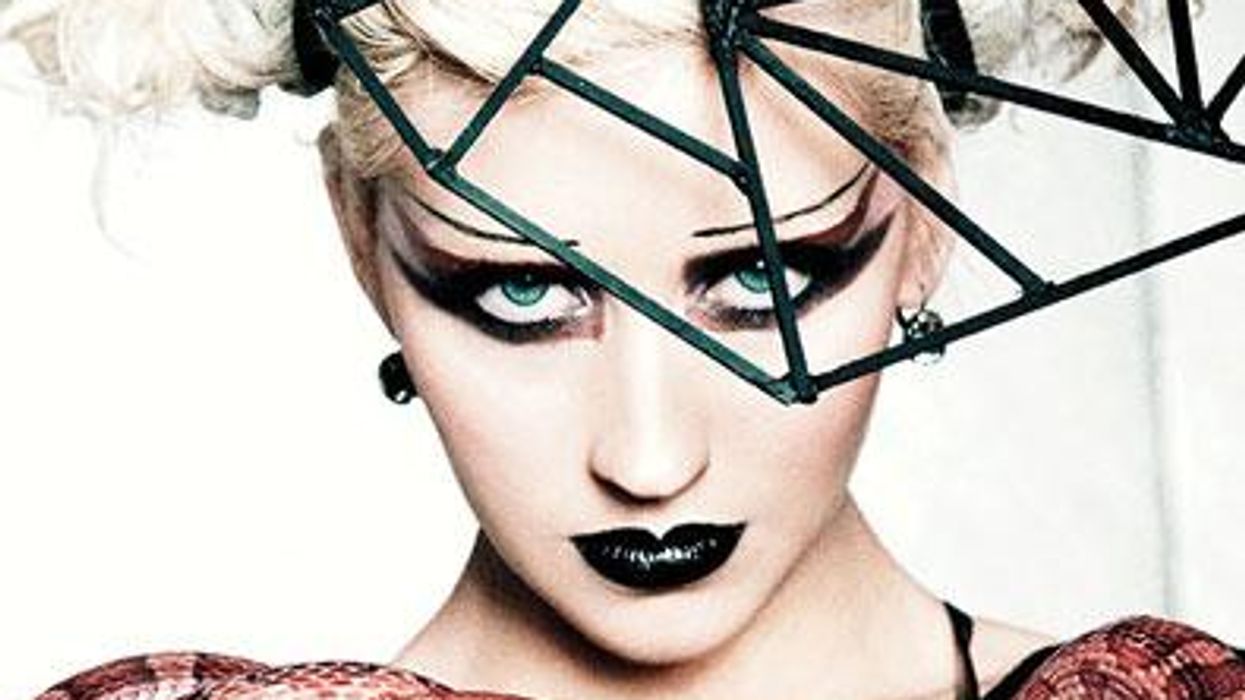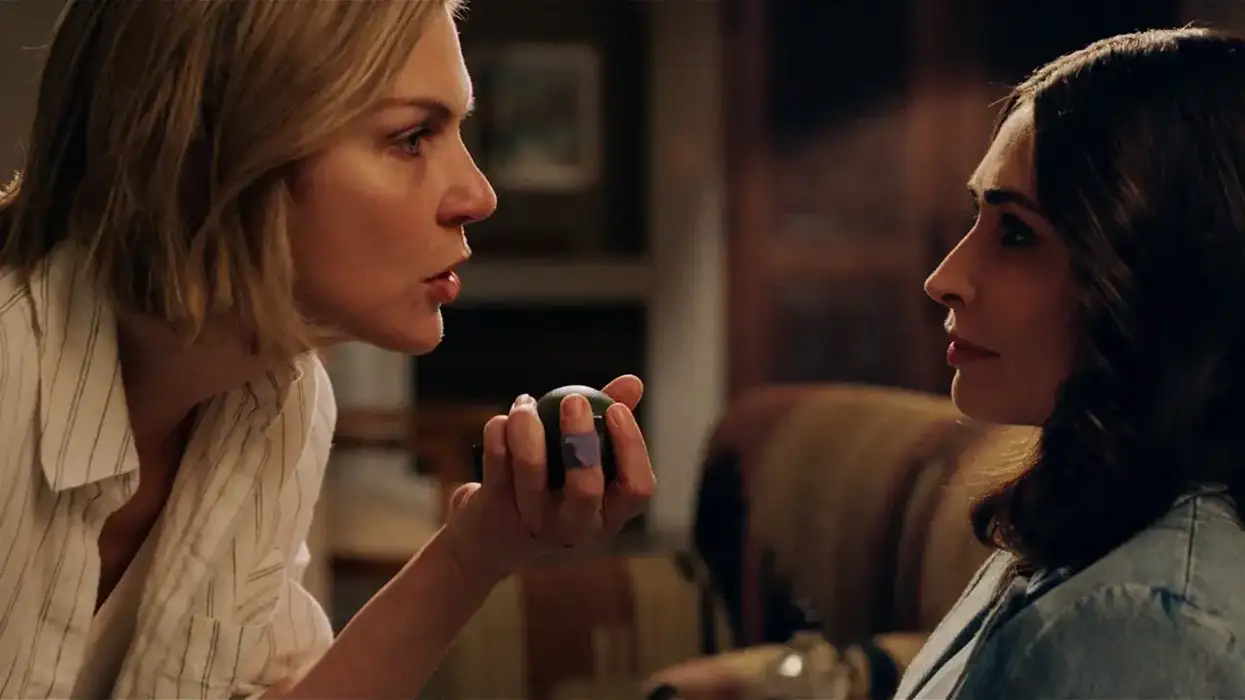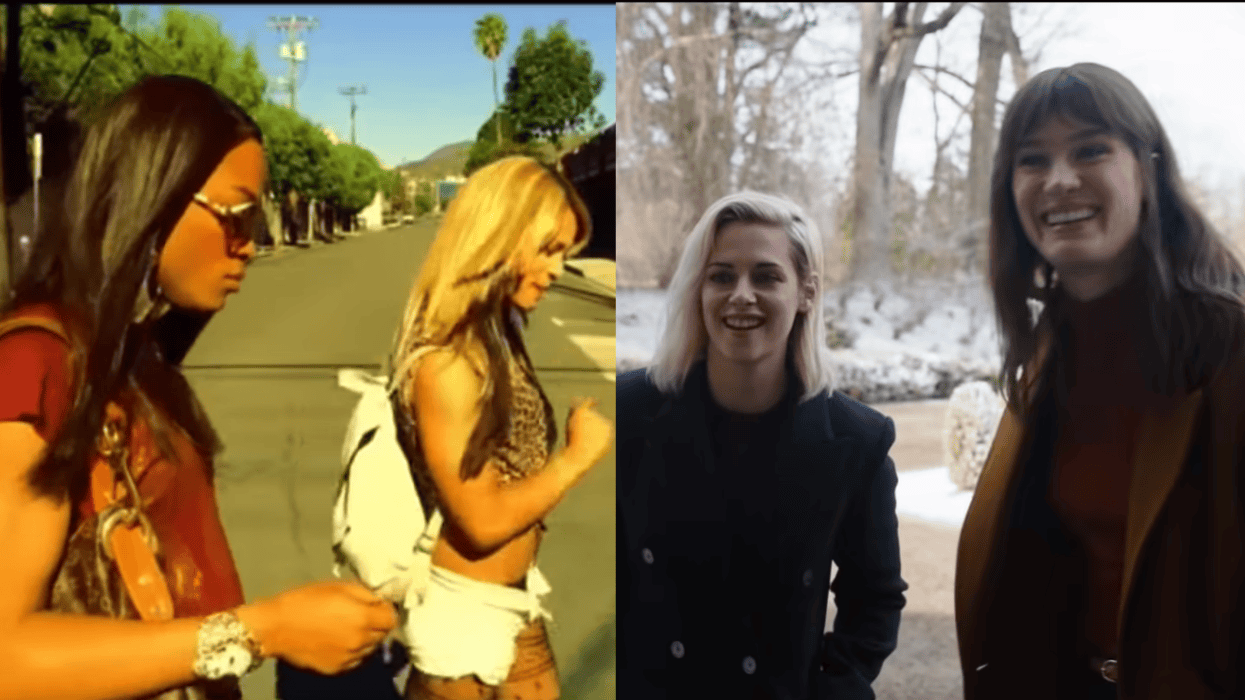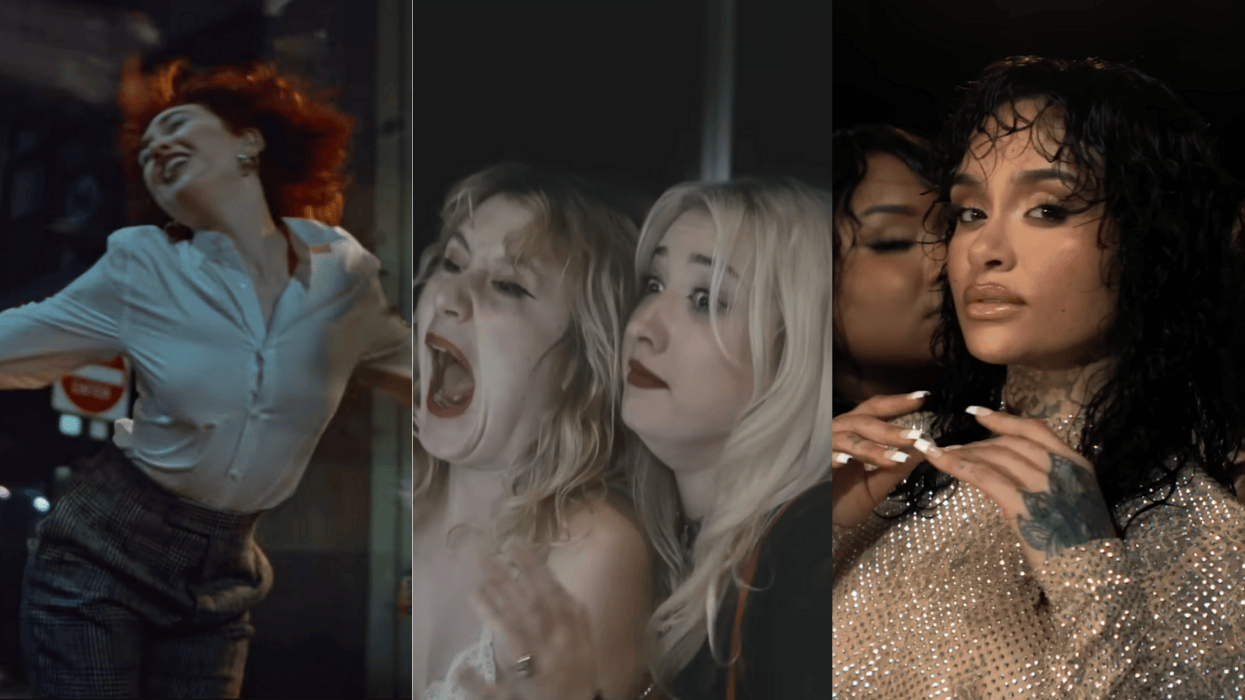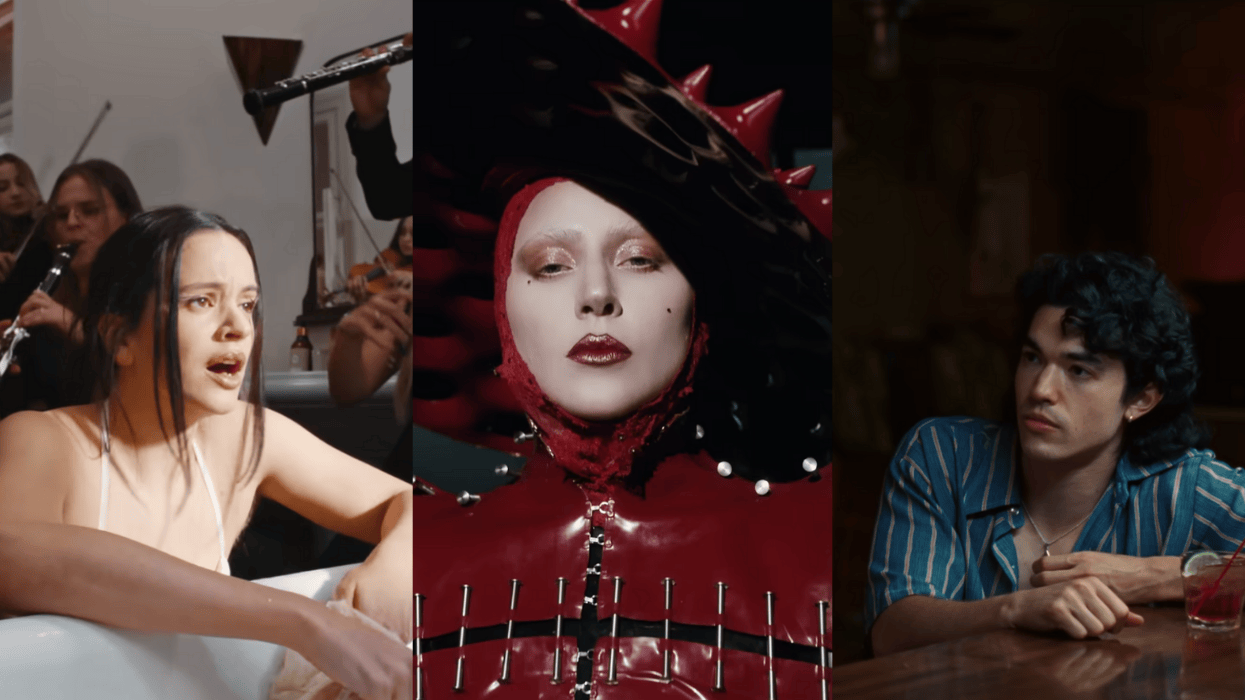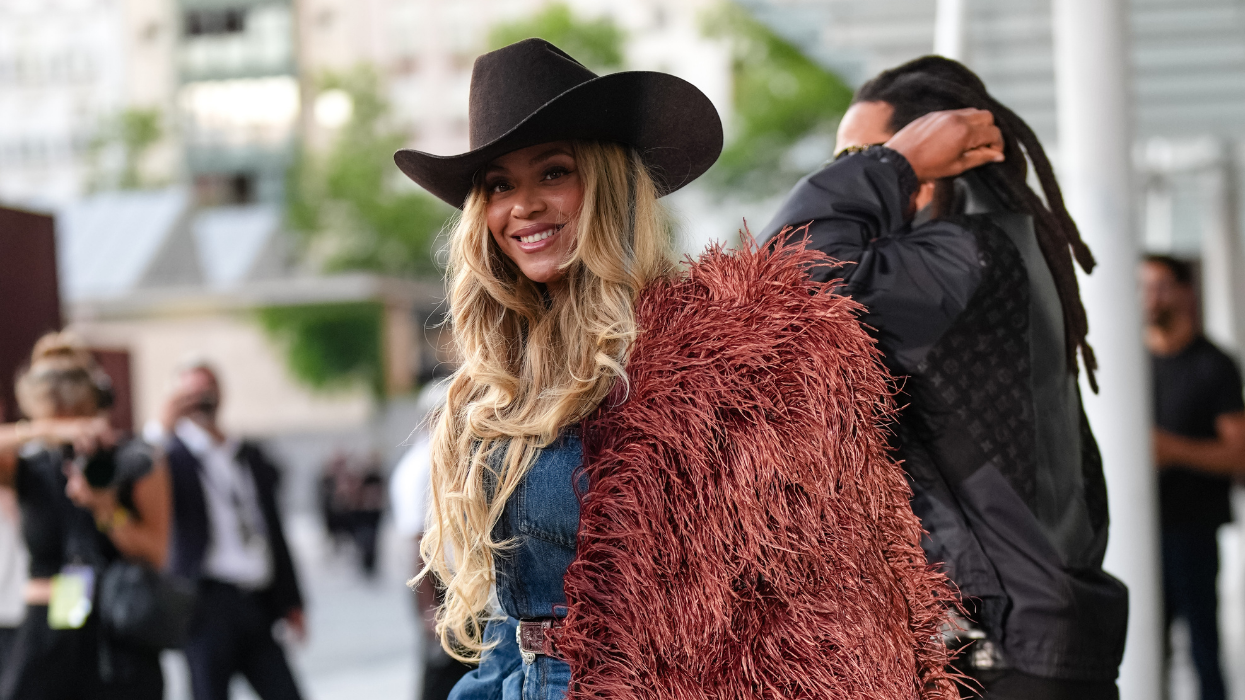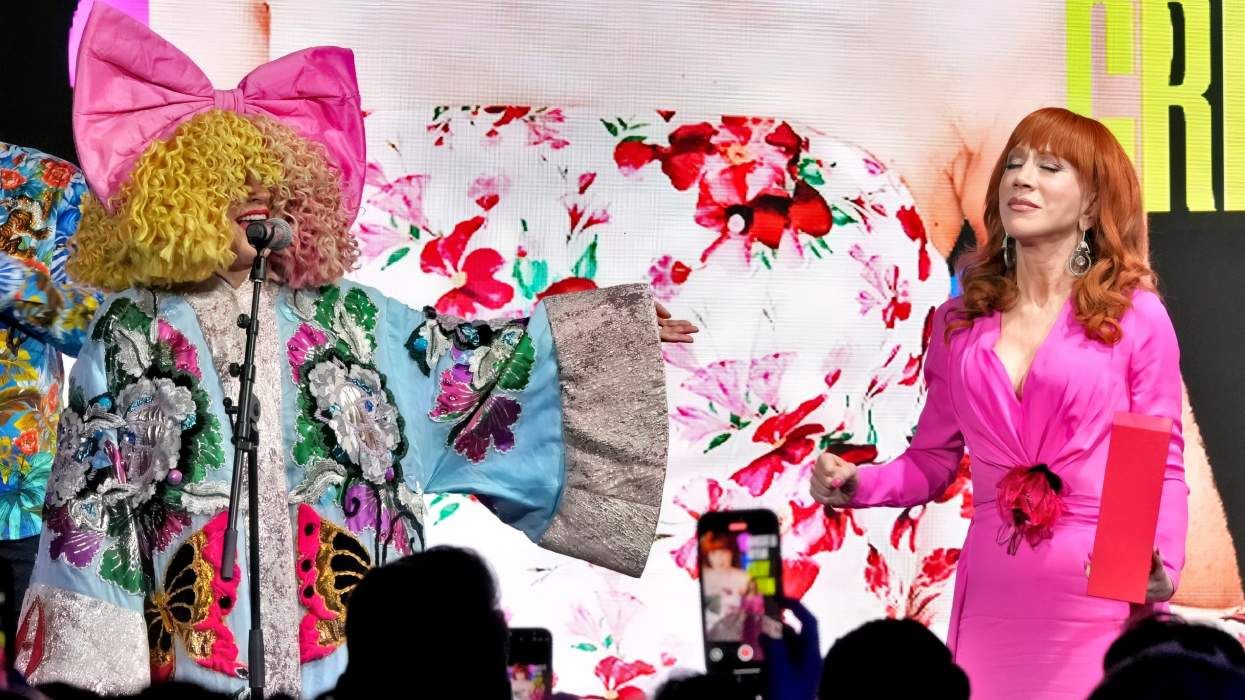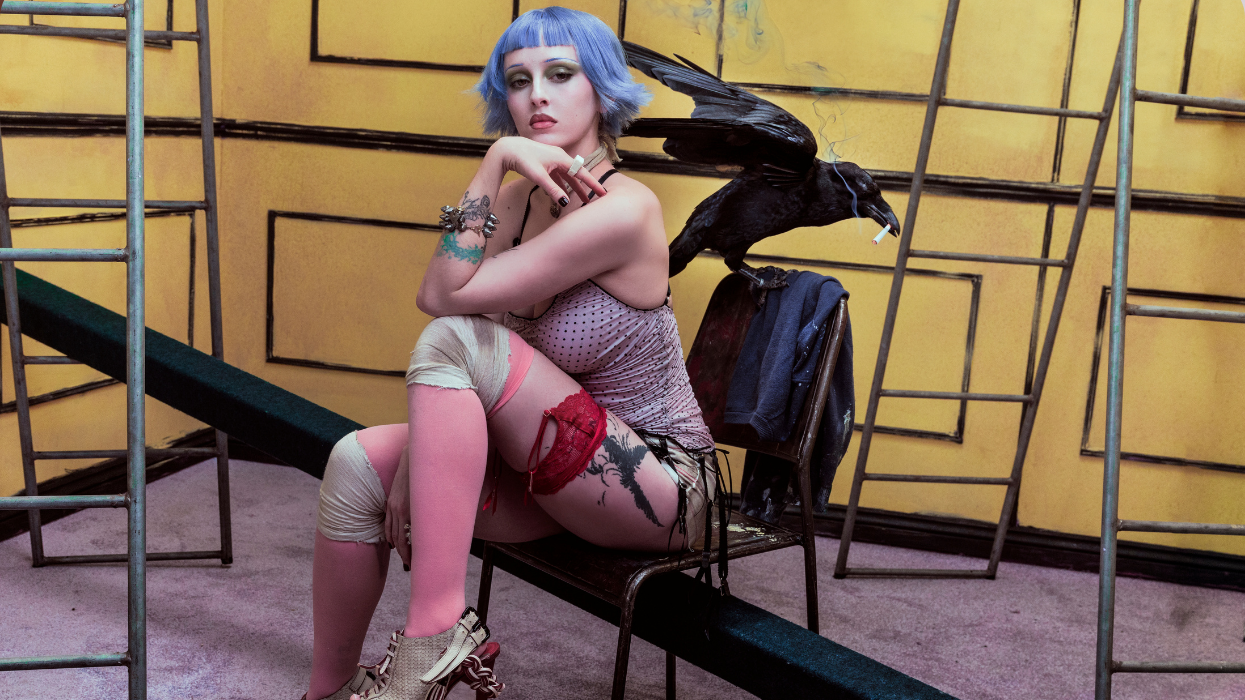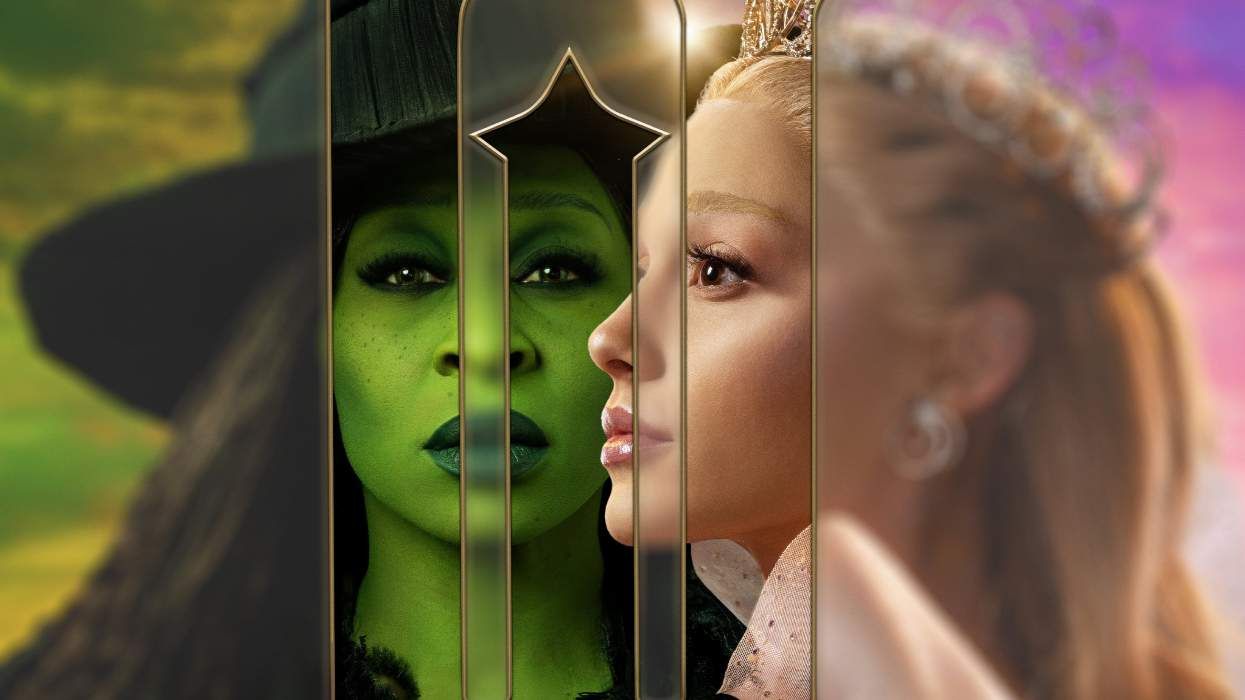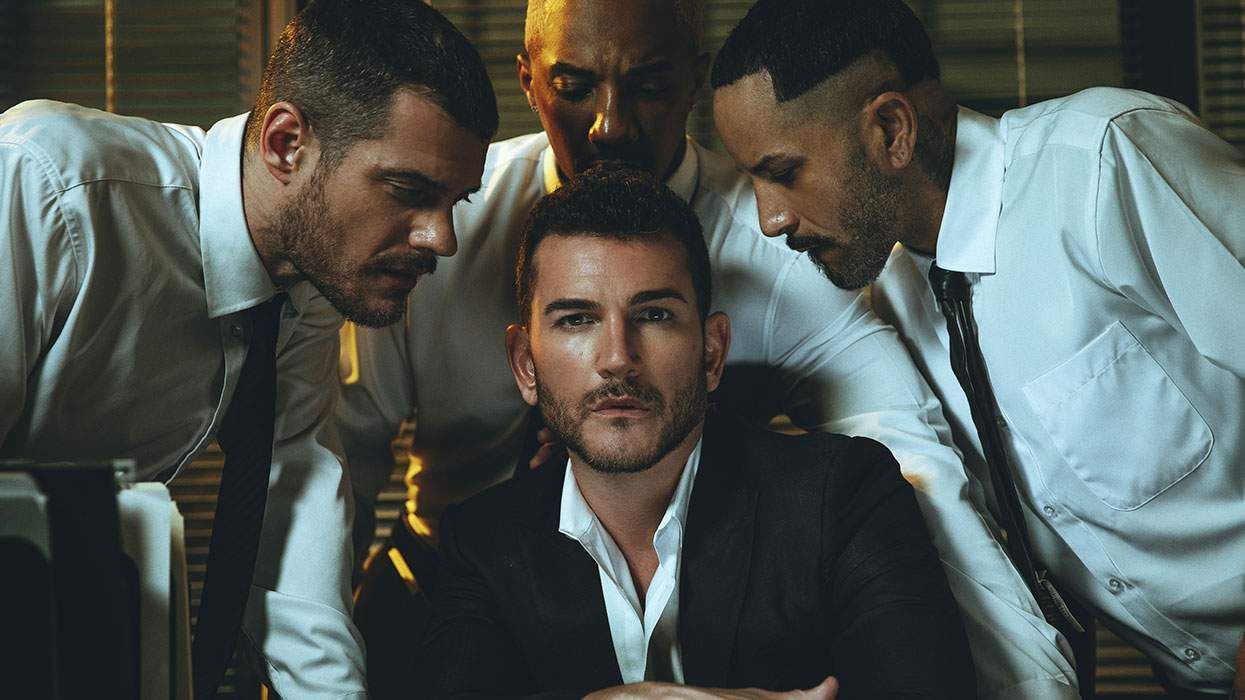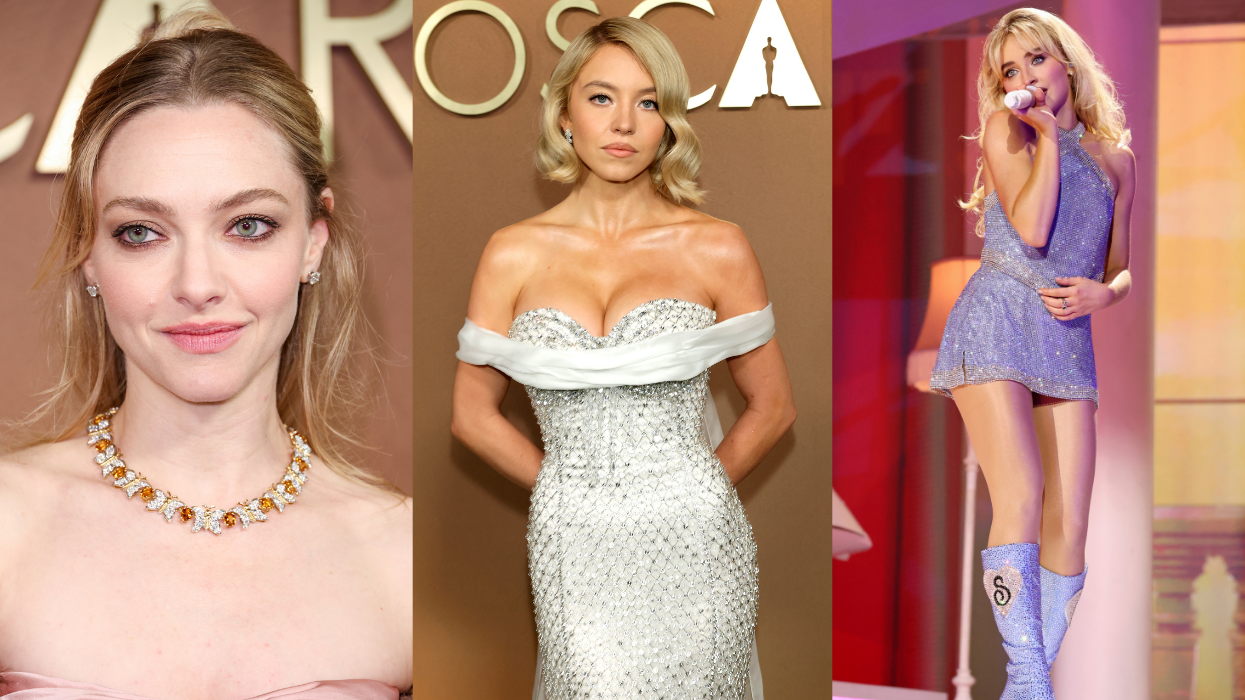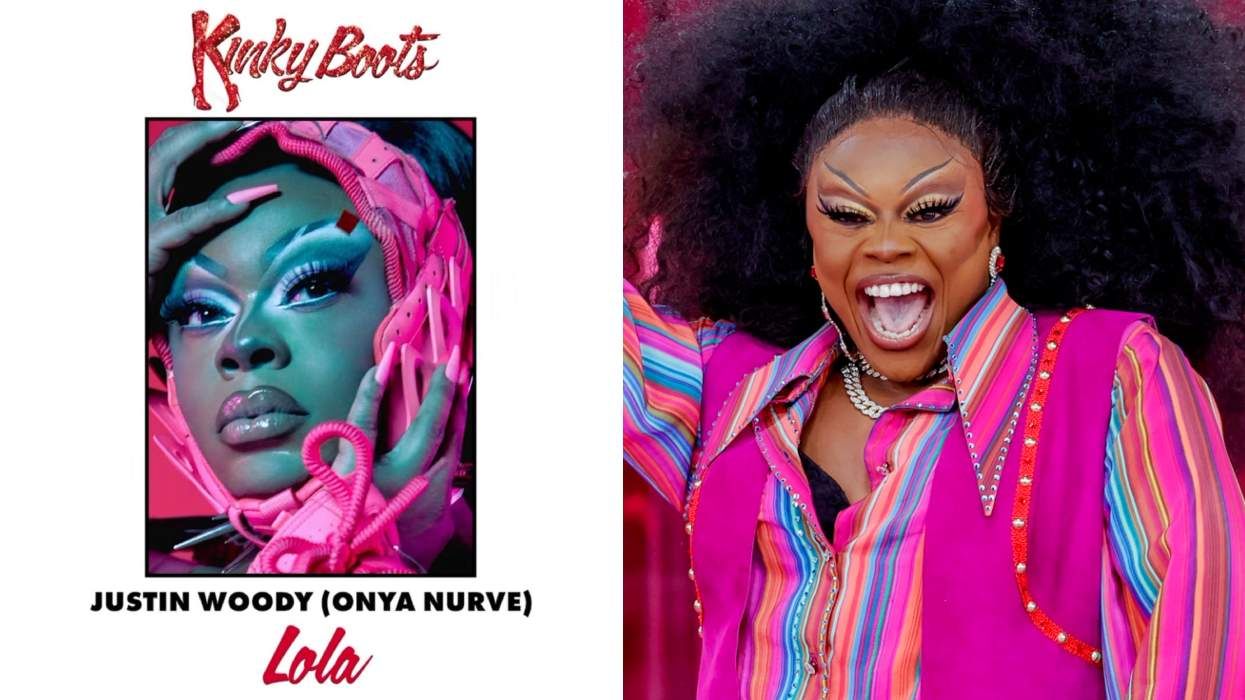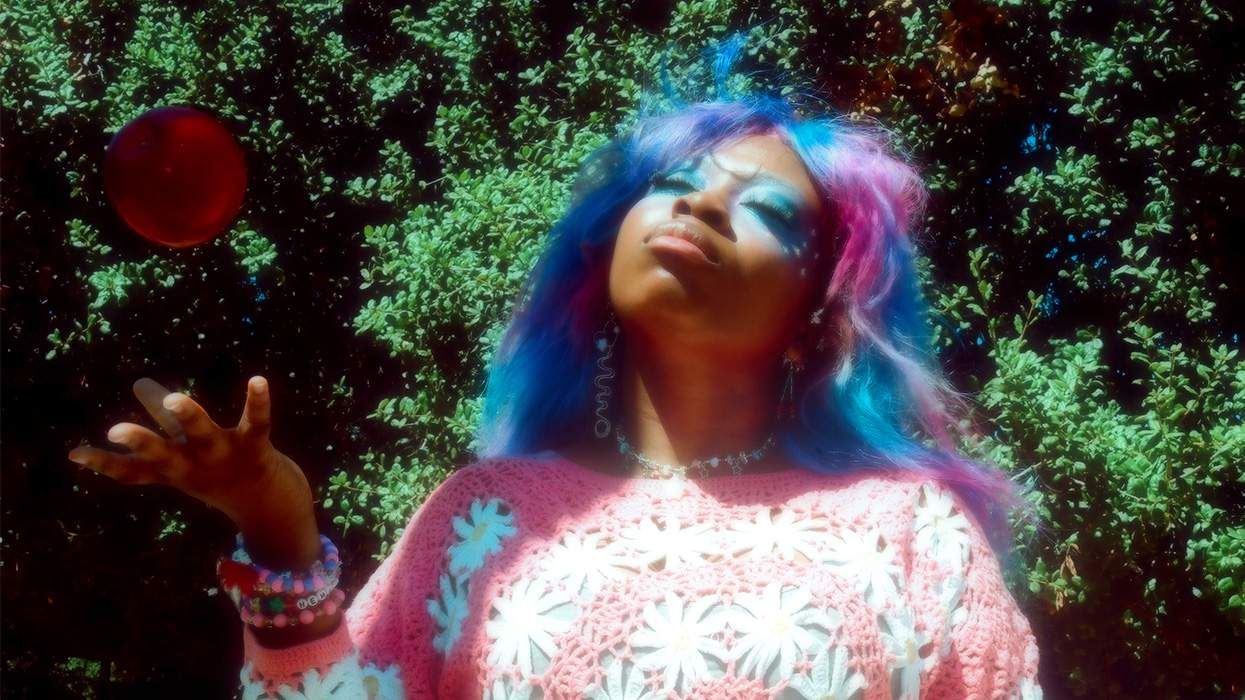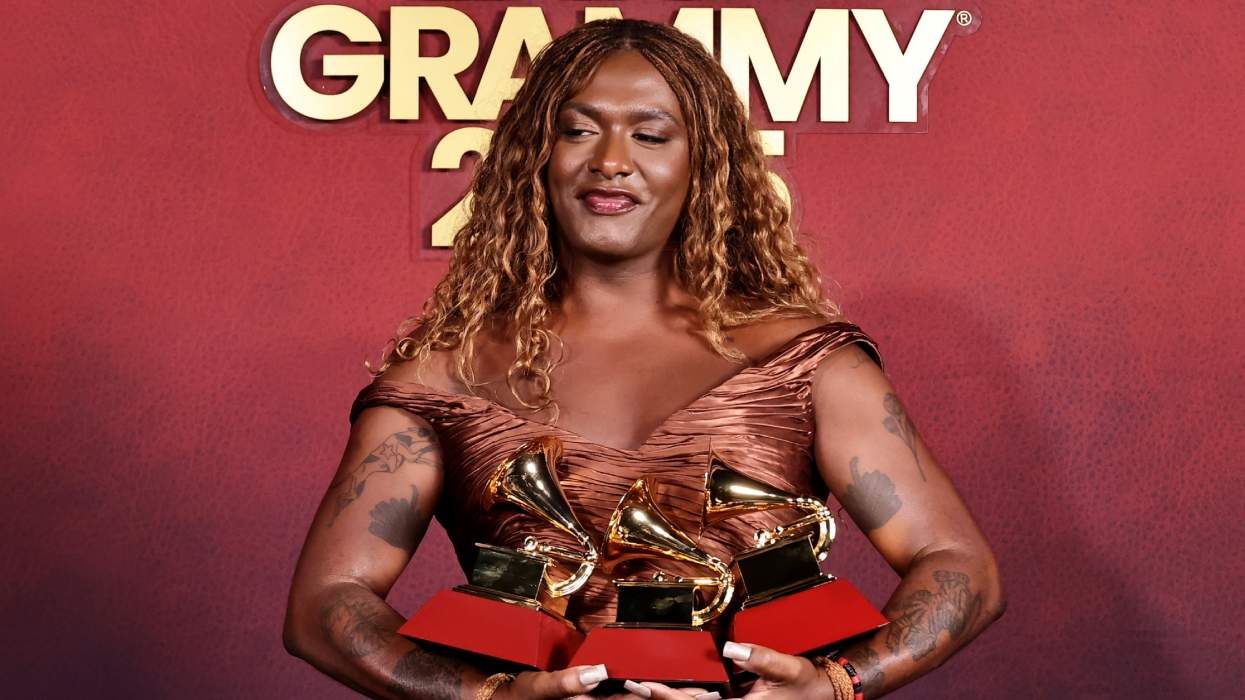Christina Aguilera, now 29, lives in Ozzy Osbourne's old house right off the Sunset Strip with her 2-year-old kid, Max Liron, her husband Jordan 'Jordy' Bratman, and a platoon of Latinos who dust, Swiffer, sweep, and generally keep the manor. The house has been thoroughly Aguilerized with zebra- and leopard-print carpets and Shepard Fairey prints that scream Obey from the walls. The doorknobs, at least, are holdovers from the Osbourne era, heavy iron affairs with Gothic crosses on them. The other holdover is the recording studio, a converted pool house past a courtyard full of teak gazebos, lightly melted Buddha-head candles, and a sad Kermit doll lying face down in the pool like Joe Gillis in Sunset Boulevard. The pool house is where Aguilera recorded most of her new album and where the singer is now curled up, Betty Page style, on a sofa, with those famous red lips wrapped around a Ricola.
Hanging above the sofa is a creepy painting by British graffiti artist D*Face. It's a portrait of John Lennon, but with half the Beatle's face depicted as a skull. It's a pop art 'ashes to ashes, dust to dust' and it doesn't seem to fit Aguilera's still girly demeanor. She's tiny, even in a pair of Louboutin heels. Her hair is pixie cut and platinum blonde, her jeans are ripped, and her voice -- considering it can jump four octaves in a single sweep -- is surprisingly quiet. 'Jordy and I collect a lot of graffiti art,' she explains. 'D*Face is an artist who takes these images and defaces them. In the foyer, we have that Warhol Marilyn Monroe he did that's half a skull. I like the dark side.' In fact, the cover of her new album, Bionic, features a D*Face portrait of Aguilera, one half of her face notably Marilyn Monrovian, the other a robotic consortium of gramophones and Edison bulbs. Her bright red Rocky Horror lips are the bridge that connects the two halves.
Bionic does not logically follow from her last album or the one before that. From pop tart to Angry Young Woman (Stripped) to Marilyn Monroe (Back to Basics), the sequence of Aguilera's sound is as wild as the wind. Her voice is a mercenary, one of the perks -- and pitfalls -- of being a versatile medium. 'Every album has been a 180 from the past,' she admits. 'On Bionic, I wanted to go completely futuristic. As a new mother, I was thinking about the future generation, so I was inspired a lot by electronic music.' When she began the album, Aguilera put out a call to artists whose work she found simpatico, an unexpected cavalcade including underground faves Le Tigre, Goldfrapp, and Ladytron. 'It's a gamble,' Aguilera says of the cattle call. 'You never really know who's going to get it and who's not.'
Sia Furler, professionally known as Sia and as the best Australian queer blue-eyed soul singer, got it. Her contribution to the album'four songs written with her bassist, Sam Dixon'is what Aguilera calls, 'the heart of the album.' One song in particular, a raw, shuffling, vocally demanding Etta James'type ballad called 'You Lost Me,' is not only the heart of the album but a defining apex of Aguilera's career. Those four minutes alone are enough to ensure Aguilera's place alongside Nina Simone and Whitney Houston in the soul pantheon. In its simple progression, Aguilera finds a song strong enough to withstand the blistering power of her voice. Sia's words, stricken with the grief of abandonment and betrayal, release Aguilera's voice, ranging from a deep, defiant growl to a lonely, high, vaporlike whisper. 'The things she can do with her voice are insane,' says Sia, 'but I really like it when she's doing less of the squiggly diddlying. There were times when I'd just say 'I think you should just sing it straight.' I feel most able to identify with her and her vulnerability when she just sings simply with that amazing tone of hers.'
As in 'Beautiful,' written for her by former 4 Non Blonde Linda Perry, the grain of Aguilera's voice is audible in 'You Lost Me.' It crackles like an old phonograph at times, gathers itself up and takes to the keep in others. It breathes and sighs and writhes. It's too big to fail but not too proud to falter. 'It was hard for me. I really am a perfectionist,' says Aguilera. 'I like to perfect a vocal and really make sure of every note. Even if it's good I'll go in to see if I get a better one. But when I get in studio with people like Linda or Sia, I'm able just to find inspiration inside the music in a different way. I can find the beauty in the imperfections.'
If you haven't met her, disliking Christina Aguilera isn't difficult. The blonde nymph whose midriff defies coverage has stood for crass pop culture since 1999 when she sang 'I'm a genie in a bottle / You gotta rub me the right way, honey.' But the song spread like an 88 bpm contagion, engulfing clubs and bars, cabs and cars as it raged toward platinum, then double platinum, then triple, all the way to sextuple platinum. Our bodies were saying let's go, but our hearts were saying no, and when the dust settled and dawn came, we dismissed the song and the singer with the zeal of the shamed. But to dismiss Aguilera as a trifle is to do away with a serious, courageous artist. To refuse to listen to her out of contemptuous music snobbery is to deprive oneself of one of pop's greatest voices.
Aguilera's pool house is no cabin in the woods. Not by nature a songwriter, Aguilera is largely dependent on others such as Sia, Perry, and a small cottage industry of modern day West Coast Tin Pan Alley men to furnish the words and melodic armature of her voice. Much of the success and failure of her work rests not so much on her own voice -- which emerged when she was 6 years old fully formed, a combination of gymnastic ability, rich amber tone, and sexiness obscenely beyond her years -- but on how her voice is used and on what she says with it.
In her eponymous debut album, when Aguilera was green, new to Los Angeles, and with little agency, her voice was chained to inane easy-to-hum hooks. 'Genie in a Bottle' and 'What a Girl Wants' made her a star, but her virtuosic range was often offloaded into ballads or brief overdubs that left her voice exposed, awkward, and off-putting. In her follow-up album, Stripped, Aguilera repudiates the pop sausage machine that had ground her into a girl sex genie. 'On that first album, I was creatively stifled,' she says. 'On Stripped I was like, I don't give a fuck.' With its shades of 'Dear Prudence' and a message that diverged from the wish-granting fantasy, 'Beautiful' was all 'Genie in a Bottle' wasn't: a song that set Aguilera free.
Knowing her media savvy and her checkered past, it's easy to dismiss her claim, 'I'm kissing all the boys and the girls,' made in the single 'Not Myself Tonight,' as just another entry into the ledger of inevitable lesbian confessions made by every young pop star. After all, it was Aguilera herself, accompanied by Britney Spears, who initiated the trend, French-kissing Madonna back in 2003 at the Video Music Awards. Later, Katy Perry kissed a girl and sang about it. Gaga slobbered all over a female bodybuilder in her recent music video, 'Telephone.'
'I don't get to kiss all the girls and the boys,' Aguilera says, 'but my husband knows that I get into girls. I think it's fun to be open and play. The line is real to me. My husband and I check in with each other, but I definitely love women. I think they're more attractive to the naked eye,' she says before adding, 'I don't think I could ever really be with a woman because that's a lot of'what do you call it? Guys have testosterone, girls have'' Estrogen? 'Yeah, there's a lot of estrogen and I'm a lot to deal with when it's that time of the month, so I can't imagine it times two.' Aguilera pauses and then shakes her head. 'And you know, I love dick. To be honest, that I cannot live without.' She sucks her Ricola with a vengeance.
Though it could be said that behind every great pop star is a gay cadre, often it's there in the capacity of courtiers, not collaborators. But in Aguilera's case nearly every one of her artistic triumphs was born from a gay relationship, or at least a relationship with a gay: Perry's 'Beautiful'; Ricky Martin, with whom Aguilera recorded 'Nobody Wants to be Lonely'; on this album, Sia and her girlfriend, JD Samson of Le Tigre. 'I feel like Christina's probably supporting the majority of the lesbian scene in Los Angeles because she really only works with gaylords, like her dog walker, her personal trainer, her cowriters,' jokes Sia, but it's not far from the truth. Bisexual or not, Aguilera is queer in the word's most literal sense.
Not to mention Lady Gaga in an article about pop music in general and Christina Aguilera in particular would be like writing a thesis on omelets and leaving out eggs. Gaga, like her or not, now dictates the terms of the pop conversation. She's the star around which the pop universe spins. Plus, the two have history.
Rivalry's nothing new to Aguilera, who spent her childhood years dominating talent shows in the metropolitan Pittsburgh area and her early adolescence jockeying for position on The Mickey Mouse Club against littermates Britney Spears and Justin Timberlake. Her late teens and 20s passed locked in a dead heat with her former BFF, Britney. But, as it relates to Lady Gaga, one might think comparisons to be especially odious. 'Oh, the newcomer?' Aguilera chuckles. 'I think she's really fun to look at.' Nevertheless, Aguilera has come under fire for aping Gaga's style and the criticisms have irked her. In 2008, when asked by the Los Angeles Times about the comparison, Aguilera denied all knowledge of Gaga's existence. 'I'm a little under a rock where some things are concerned,' she said then and says again now.
Gaga v. Aguilera might be the El Alamein of pop music. Gaga's rise is a blitzkrieg to the top, a mad dash upward with only one album (and a half) for support, while Aguilera has amassed her forces for more than a decade, assembling hits and producers, engineers and radio support. Each Aguilera album comes slowly and painstakingly planned. Though she's loath to admit influence, Bionic is Aguilera's war of attrition against Gaga; a fight in which she attempts to out-Gaga Gaga -- hit for hit -- and come out ahead. It's a dangerous strategy. One track in particular, a song produced by Christopher 'Tricky' Stewart called 'Glam,' stands out as a direct bombardment of the Gaga positions. But is it a jab or simply derivative, a bean counter's hedge on an important album? It's hard to say. Certainly, it's catchy, but the victory is Pyrrhic. Aguilera's voice is held hostage, confined to an octave, reduced to a mnemonic device and the lowest common denominator. It's frustrating and disappointing to hear her, in songs like 'Not Myself Tonight' and 'Glam,' operate at such fractional capacity. Keeping up with the Joneses, or the Gagas, slows her down. Luckily for Aguilera, her songs with Sia, songs like 'You Lost Me,' are proof of her technical superiority.
Gaga writes hooks with nursery rhyme simplicity, easy to hum and hard to forget. Aguilera foregoes hooks for vocal virtuosity, though she admits, 'it's a little more off-putting to the general public because it's not easy to sing along to.' Gaga talks about art and sings about cell phone reception and disco sticks. Aguilera isn't given to public pronouncements outside her narrow area of expertise and sings about vulnerability and expectation, loss and strength, abuse and acceptance. Gaga is her art, she claims. Aguilera says, 'I used to think, My art is me, and it's just not like that. You can't be that egotistical.' Gaga is topiary, highly pruned and stylized. Aguilera is a jungle, wild and overgrown.
In a few months, Burlesque, the film starring Cher, Stanley Tucci, and, making her screen debut, Aguilera, will be in theaters. Max will be out of his terrible twos, but Bionic will have reached number one on the pop charts, probably carried there by 'Not Myself Tonight.' As for Aguilera herself, sitting here toying with the heel of her shoe, she'll have melted away. When she returns, you might not recognize her. Her hair might change from blonde to ginger, her look from futuristic to psychedelic. But as soon as she opens her mouth to sing, there will be no doubt: Christina Aguilera has returned.
To see our exclusive slide show of Xtina from our sideshow-inspired cover story shot by Ellen von Unwerth, click here.


